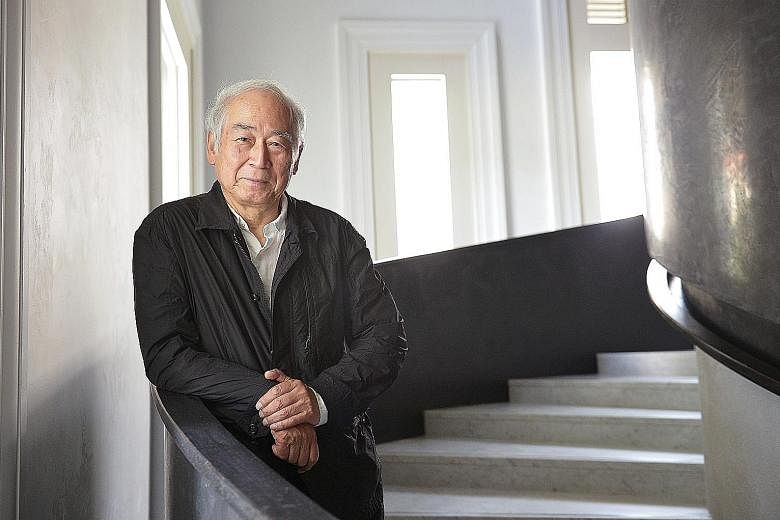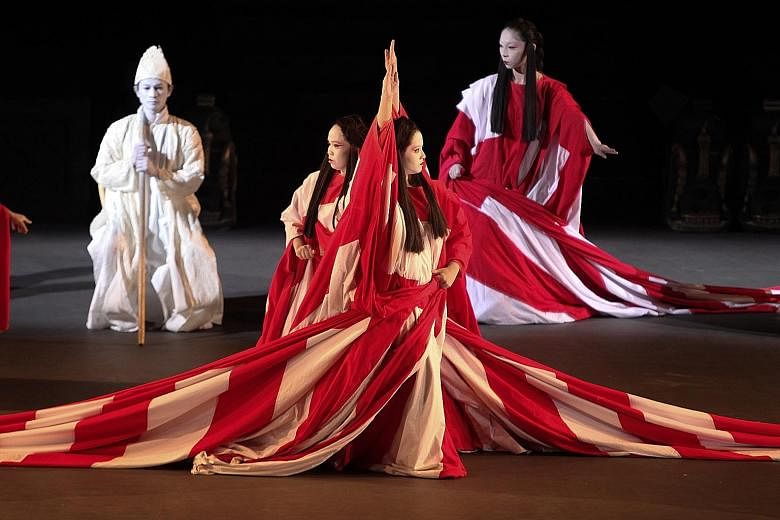A month before his 80th birthday, Japanese director Tadashi Suzuki moves briskly around the stage of Victoria Theatre, fixing lights and adjusting actor positions.
"I'm not one of those directors who just sits there feeling cold," he says in Japanese, in a playful dig at members of his Suzuki Company of Toga (Scot), whom he chastises for "sitting still and thinking".
Movement is, after all, key to Suzuki's philosophy of theatre and his famous Suzuki Method of Acting. It trains performers to be aware of their physicality and breathing and work towards being more physically and emotionally committed on stage.
A decade after he staged his adaptation of the Greek tragedy Electra here for the Singapore Arts Festival, he is back at Victoria Theatre to stage an adaptation of another 2,000-year-old classic by the 5th-century BC playwright Euripides for the Singapore International Festival of Arts.
Dionysus, which dates back to 1990, is Suzuki's take on The Bacchae, a story of religious frenzy and rebellion against tyranny. The king Pentheus outlaws the worship of the wine god Bacchus, or Dionysus, and is killed by fevered worshippers (the Bacchae), including his mother.
Dionysus is co-produced with The Japan Foundation Asia Center, Scot and Purnati Indonesia. The cast of 15 features a dozen Indonesian performers, who trained under the Suzuki Method with their counterparts from Scot.
-
BOOK IT /SINGAPORE INTERNATIONAL FESTIVAL OF ARTS: DIONYSUS
-
WHERE: Victoria Theatre, 9 Empress Place
WHEN: Today, 3 and 8pm
ADMISSION: $40 and $60 from sifa.sg or Sistic (call 6348-5555 or go to sistic.com.sg)
INFO: Performed in Batak, Japanese, Javanese, Madurese, Manado, Mandarin, Sundanese, Rejang with English surtitles (some violence)
It has been said that none of his actors dare lift a finger without Suzuki's express order - though when asked if this is true, the director laughs and shakes his head.
"What we share is the same sensibilities of training," he says. "The Indonesian performers, in particular, are very sensitive physically and can incorporate the training, so you get a quality that American actors would not be able to get." (This is a friendly dig at American artist Kameron Steele, a member of Scot who serves as translator during the interview.)
The Bacchae has fascinated Suzuki for 40 years. His adaptation in the 1970s focused on the downfall of tyranny and another in 1990 emphasised the folly of following cult leaders.
To Suzuki, the story is about the tension between man and nature, with nature taking bloody revenge as man moves into urbanised settings. It is also about the clash between politics and religion, which he says continues in many countries around the world.
Indonesia is a place which embodies the tension at the heart of Dionysus, he says, noting that the country is rocked by earthquakes as well as religious and political strife.
When this version of Dionysus was first staged at the Prambanan temples in Yogyakarta in October last year, the director recalls the moon rising over the stage to remind viewers of the disconnect that exists nowadays between humans and nature. In contrast, this second staging in Singapore at Victoria Theatre will evoke humanity's desire to create political structures to govern their lives.
Reminded that Singapore is commemorating its colonial past this year, he says that colonial rule is something that almost all countries in Asia have experienced. His favourite play by Euripides is Trojan Women (a Korean version of which showed at the arts festival here two years ago, helmed by Singaporean director Ong Keng Sen to critical acclaim). Suzuki lauds Euripides for daring to criticise his own country's brutal occupation of Troy.
"If you look at Japanese history, in the 20th century, Japan went into many countries in Asia and dominated them. To imagine a Japanese author would write a play from the perspective of a Chinese woman whose country had been destroyed by Japan - that would take an immense amount of courage.
"When I think that in Greece, this was allowed and regular citizens went and watched this play - it really impressed me."
In this cross-cultural production of Dionysus, a cast of Japanese, Chinese and Indonesian actors speak multiple languages and move in perfect precision.
Suzuki thinks that theatre should reflect the multicultural reality of the world where people of different origins live and work together.
"If you go see professional sports, if you go see a symphony orchestra, all the players are speaking different languages. Even in many big companies, the members are all from different countries and speak different languages. If you have a shared grammar, shared rules, you can communicate and create a world together."
He adds that the "musicality" of multiple languages interacting on stage add to the experience: "It's not interesting, just understanding the meaning of the words. You can enjoy the play in a musical way."



